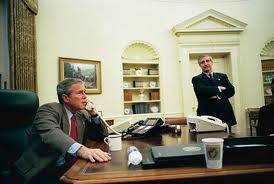 wn.com
One of a presidential chief of staff’s greatest challenges is deciding what is important for the president to know.
“Presidents, like everybody else, want to know everything,” said Andrew Card, former White House chief of staff for George W. Bush from 2000-2006. “It’s the chief of staff’s job to make sure that the president has what he needs — but not everything he wants — and that he focuses on real presidential decisions, rather than just government decisions.”
Card, who joined Steve Scully, the political editor for the C-SPAN networks, and participating students from George Mason University, Purdue University and the University of Denver for a live video conference on Apr. 7, provided a window into a chief of staff’s daily life.
“I would try to be at my desk at 5:30 in the morning,” Card said. “The first document that I would read would be the President’s Daily Brief, the PDB. That would be information and analysis that came from the CIA. Then I would read economic and domestic news.”
Card also kept constant tabs on the whereabouts of the first and second families using a little locator box on his desk. Days were not limited to eight-hour shifts.
“You don’t do real work while the sun is shining,” said Card. “You do the work in the middle of the night. It wasn’t unusual for me to get a call from the speaker to come to the House at two, three or four o’clock in the morning.”
The president’s job is an even more demanding one.
“The president had to face unprecedented challenges,” Card said. “I watched President George W. Bush lead with presidential courage. He had the courage to make very, very tough decisions.”
Card shared some insights into the Bush administration:
- At first, everyone thought a plane flying into one of the World Trade Center towers was “a horrible accident.”
- The realization that America was under attack by terrorists caused Bush to focus “on the unique and unbelievably lonely responsibility he had to preserve, protect and defend.”
- The “Mission Accomplished” banner on the aircraft carrier USS Abraham Lincoln celebrated the successful completion of a mission by the carrier, its leadership and its crew. The banner “was never meant to be part of the overall messaging of the president’s speech. If you read the president’s speech, he never said that he accomplished the mission of the battles in Iraq.”
- Bush did not have a victory celebration after either of his elections.
- In his second term, Bush wanted to reform Social Security and immigration.
In an apparent swipe at Obama, Card said Bush did not allow politics to drive his decision-making.
“Presidents have to be love magnets when they seek office, but they have to have the courage to be lonely while they serve,” said Card. “Some presidents don’t know how to do both of those inconsistent things at the same time.”
Card hammered the point home further.
“Being smart includes recognizing the world as it is, rather than what you want it to be,” Card said. “It’s very difficult to deal with the world as it is.”
To illustrate, Card enumerated various crises, other than 9/11, during the Bush administration:
Professor Steve Klein asked, “How much don’t we know and never learn of ?”
Card confessed that what he misses the most is the information he was privy to, even though it was “frightening, the enemy is real and challenging to thwart.”
Produced by C-SPAN, the distance learning course is a unique opportunity for students to interview guests via video conference. It airs on Friday at 5 p.m. and also streams online (http://www.c-span.org/Distance_Learning/).
 No Comments »
No Comments »
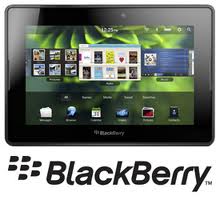 devwebpro.com
Adam Ostrow and Christina Warren co-authored a new article on Mashable.com titled “BlackBerry PlayBook Enters the Tablet Race.” The review was based on feedback after Mashable tested the device for a week.
The results:
Build, Form Factor and Screen
- Weighs 425 grams, feels sturdy and compact
- 7-inch
- Resolution 1024 x 600
- Landscape mode: feels similar to iPad; text clear, graphics bright, keyboard feels good to the touch
- Portrait mode: reading text on most web sites almost impossible without zooming, keyboard uncomfortable
- Screen: WSVGA rather than IPS, colors still look good, touch screen very responsive, accelerometer fast, works in all directions
User Experience
- Interface: easy to pick up
- Screen: black bezel on top and bottom is touch sensitive; swiping finger up from bottom minimizes apps and shows home screen; menu or status bar accessed by swiping down from top or diagonally from top left; swiping from lower left or right side switched between open apps
- Notifications: accessed by tapping on them in status bar; dismissed by swiping from left to right
Apps
- In addition to apps built in Adobe Air, PlayBook supports older BlackBerry OS apps and (though not at launch) Android 2.x apps
- Ships with a variety of pre-installed apps
- To access BlackBerry mail client, BlackBerry Messenger, address book: must connect BlackBerry devices to PlayBook through a Bridge mode that allows PlayBook to access data without storing it; non-BlackBerry owners need to use a web client to receive and send email
Browser
- Supports Adobe Flash 10.2 out of the box, but some heavily Flash-based sites like Google Maps didn’t work well in PlayBook’s browser
- Facebook: user can’t get notifications from Facebook or easily accessed messages from a central location
Connectivity and Camera
- Both cameras have solid optics
- PlayBook too large to act as a real optical device; should work well in the field and for video chat
- Mini-HDMI port: allows users to interact with content, games and video on a second screen
- Ability to sync wirelessly with your desktop or laptop computer
Sink or Swim?
- Appeal of PlayBook currently limited to existing BlackBerry smartphone customers as a result of email and messaging limitations
- Lack of apps until Android apps become available on PlayBook
- Users preferred a larger screen
- PlayBook not recommended over iPad 2 or Motorola Xoom at this time
 No Comments »
No Comments »
 wikipedia.com Tired of those generic hotels? Got plenty of dough to throw around?
Airbnb, a vacation rentals startup, in partnership with Rent a Village by Xnet, offers some ultra luxurious listings for those with deep pockets. You can “rent anything from a couch to a country.” Examples include:
- Austrian village — Goldegg, in the heart of Salzburg land — $65,000 a night
- German wine village — Deidesheim — $50,000 a night
- A Swiss mountain village — $60,000
- An entire European country (granted, a very small one) — The Principality of Liechtenstein — $70,000 a night
You will be happy to know that the little people — local vendors and service providers — will earn a living from your excesses. It’s a win-win for everyone!
To be fair, Airbnb, ” a global network of accommodations offered by locals,” also offers many vacation rentals at reasonable prices for the rest of us.
 No Comments »
No Comments »
 webanddesigns.com Scott Gerber, whose article “8 Ways Entrepreneurs Can Get More Out of Twitter” is featured on Mashable.com, asked a panel of young, successful entrepreneurs how other entrepreneurs can utilize Twitter to their advantage. They advised:
- Twitter is a social tool — interact and be social, find out what customers want or need
- Avoid insecurity work — limit Twitter time to less than half an hour a day
- Engage with your followers — converse about their lives, don’t market
- Set up an Autoresponder
- Provide value — get software like Tweet Adder to help
- Provide relevant information — create genuine dialogue + interaction
- Be personal and interesting — retweet interesting links, useful articles + photos
- Follow Twitter etiquette: listen, be relevant, mind your brand, engage, give more than you get
 No Comments »
No Comments »
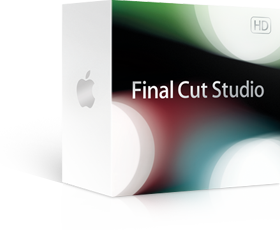 apple.com
Ben Parr’s article, “Apple Unveils Final Cut Pro X,” on Mashable.com, offers some details about this rebuild of the 12-year-old video-editing software introduced at the National Association of Broadcasters trade show in Las Vegas:
- First 64-bit version
- Can utilize all eight cores and more than 4 GB of RAM for professional editing on the Mac
- Many new features
— Advanced people-and-shot detection
— Automatic audio cleanup
— “Range-based keywording” gives video editors ability to apply keywords to specific portions of a video
— Feature that prevents audio and video tracks from accidentally being pushed out of sync
— Feature that automatically matches color between two clips
- Will be available for download from Mac App Store in June for $299
 No Comments »
No Comments »
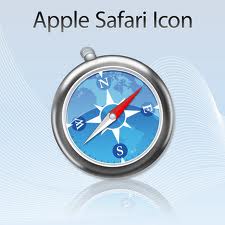 flickr.com Tired of being tracked?
Mashable.com features a new article by Jolie Odell titled “Apple Adds ‘Do Not Track’ Features to Safari.” Part of a test version of Mac OS X Lion, this new version of the Safari browser includes an option that lets users prevent cookies from tracking their online browsing behavior.
Public concerns about web browsing privacy and security caused Congress to introduce a Do Not Track Me Online bill. This bill would allow consumers to opt out of online tracking.
Major web browsers responded by adding do-not-track features:
- Firefox 4 — users can opt out of advertising-related tracking
- Internet Explorer 9 — “Tracking Protection” option — consumers can disable third-party ad software from reporting on their activities
- Google Chrome — “Keep My Opt-Outs” extension for personalized advertising and related data tracking
 No Comments »
No Comments »
In her recent article on Mashable.com, Sarah Kessler explains “How a Government Shutdown Could Affect Tech.”
 Mashable.com
- IPO Filings Put on Hold — Securities and Exchange Commission wouldn’t process any company filings
- Government Web Sites Go Dark — only essential sites necessary for operation will remain open (ex.: IRS site for filing taxes)
- Telemarketers and Spammers Celebrate — Do Not Call Registry and Spam Database won’t be available to law enforcement
- Employees Go Without Paycheck — government employees; people working for private companies on government contracts, including Google (cloud-based services) and Microsoft (Office suite services)
- Government BlackBerrys Switched Off — unessential employees would turn in BlackBerrys or be banned from using them; essential employees permitted to keep checking essential emails
 No Comments »
No Comments »
 wikipedia.org
Mashable.com features a new article by Lauren Drell titled “How To: Improve Engagement on Your Brand’s Facebook Page.” The advice comes from a new study of 200 large, well-established brands by Buddy Media.
Advice for large brands:
– Posting time/day of week depends on when brand peaks on Internet
– Patterns and trends unique to particular industries
– Content should be 80 characters or less (27 percent more engagement)
– URL should be full-length so readers know where link will take them
– Simple instructions more effective getting a “Like”
– Put question at end of post (15 percent more engagement)
– Don’t ask invasive “why” questions, ask “what”
Advice for Smaller Brands:
- Balance data from study with what you know based on Facebook Insights and personal experience with your Page
- Social marketing space constantly evolving; statistics can change in months
- Your Facebook marketing program must be flexible
 No Comments »
No Comments »
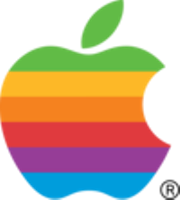 Apple Inc. In 1976 Steve Jobs, Steve Wozniak and Ronald Wayne founded a small company named Apple Computer. For its first 35 years, Apple was the underdog to its rival Microsoft. In his article on Mashable.com, “35 Years & $317 Billion Later, Apple Intends To Dominate a Post-PC World,” Ben Parr shares some little-known facts about Apple, “now the most valuable computer company in the world:”
- Apple’s market capitalization exceeds $317 billion, $100 billion more than Microsoft;
- Wayne, one of the co-founders, got cold feet and sold his 10% stake in less than two weeks;
- 1985 — CEO John Sculley forced Jobs out of the company; and
- 1997 — Jobs was brought back when Apple “was on the brink of destruction.”
Apple’s golden years followed with wildly successful products such as the iPod, iMac, MacBook, iPhone and the iPad.
So, what’s in store for Apple in the next 35 years? Parr believes Apple will dominate a post-PC “world of mobile devices … for decades to come” by competing “on design and user experience” instead of hardware specs.
Someday Jobs will leave some big shoes to fill. Parr wonders “whether anybody can provide the design and product vision” Jobs brought to the company in his “quest to redefine technology.”
 No Comments »
No Comments »
There’s a fun new article on Mashable.com titled “OMG, the Oxford English Dictionary Added New Words! We ‘Heart” It! LOL!” So, OMG, maybe the dictionary’s editor is just a Valley Girl at ‘heart,’ you know?
OMG and LOL, along with FYI, are all, according to the OED, “initialisms associated with the language of electronic communications.” It’s interesting to note that the first use of OMG dates back to a 1917 letter and in 1960 LOL meant “little old lady.” Official recognition for a word seems to be as slow as the beatification process. Who knew?
A symbol for the verb “love,” the heart sign “may be the first English usage to develop via the medium of T-shirts and bumper stickers.” In the future, we should brace ourselves for a flood of new entries based on the new social media.
There are many other new entries you can check out for yourself by clicking here. My favorites are “doughnut hole,” a dessert made from the cut out center of a doughnut, and “muffin top,” defined as “a protuberance of flesh above the waistband of a tight pair of trousers.” Too many of the first can definitely lead to the second.
 Creative Commons
 No Comments »
No Comments »
|









 Entries (RSS)
Entries (RSS)